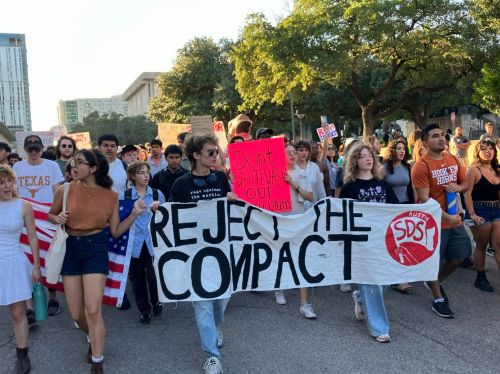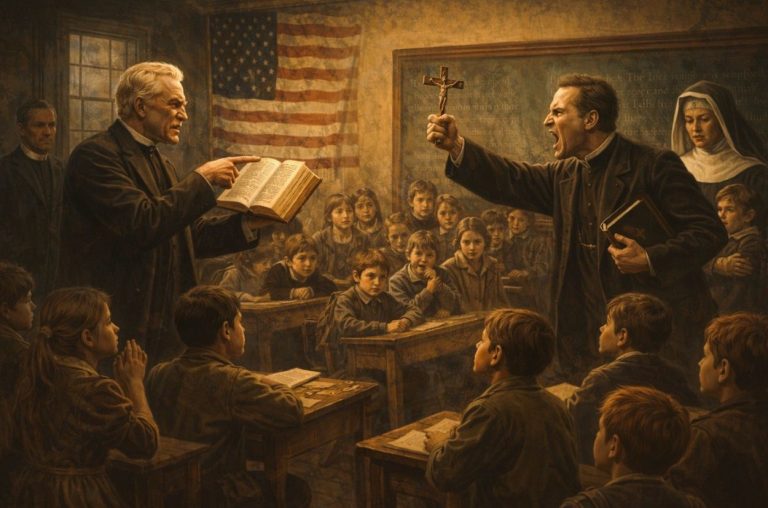

The clash over the compact echoes a familiar tension in American history, the ongoing struggle between state power and intellectual independence.

By Matthew A. McIntosh
Public Historian
Brewminate
Introduction
Donald Trump announced a sweeping new initiative known as the “Compact for Academic Excellence in Higher Education,” offering preferential federal funding to select universities that commit to promoting what the administration calls “patriotic education.” The compact outlines a vision of higher learning centered on national pride, with an explicit aim to “reaffirm America’s founding values” and counter what it describes as “divisive or anti-American narratives” in university curricula.
Seven of the nine institutions invited to sign have rejected the offer, those being the University of Arizona, Dartmouth College, the University of Pennsylvania, Brown University, the University of Southern California, the University of Virginia, and the Massachusetts Institute of Technology (MIT). Each cited threats to academic independence and scholarly integrity, echoing concerns that the compact could become a tool for ideological control over what is taught and researched on campus. Vanderbilt University agreed to the compact’s terms the University of Texas said it is open to signing.
The proposal marks the administration’s latest effort to reshape higher education policy through politically aligned funding incentives, following earlier ventures such as the short-lived 1776 Commission. Critics warn that the new compact represents an unprecedented intrusion of political power into the classroom, one that seeks not only to regulate how history is taught, but to determine which versions of it are worth funding.
The Compact’s Terms and Origins
According to an overview published by the Free Speech Center at Middle Tennessee State University, the compact establishes new federal funding preferences for institutions that agree to adopt “patriotic curriculum principles.” Those principles include highlighting the “moral vision of America’s founders,” expanding courses on constitutional history, and reframing the teaching of U.S. history to emphasize “national unity and achievement” rather than “division and grievance.”
Universities that sign the compact would receive priority consideration for federal research and development grants, additional resources for civic education programs, and streamlined access to federal partnerships. In exchange, they must demonstrate “curricular alignment” with the compact’s objectives and submit regular reports to the Department of Education on classroom content and instructional outcomes.
The initiative’s language closely mirrors earlier efforts by Trump’s 1776 Commission, which sought to promote what it called “patriotic education” as an alternative to critical race theory and other frameworks examining systemic inequality. Critics across the academic and legal community describe the compact as a revival of that same ideology, arguing that it blurs the constitutional line between government oversight and intellectual freedom.
Civil liberties advocates have raised First Amendment concerns, warning that federal funding tied to viewpoint conformity could amount to indirect censorship. “The problem isn’t that it promotes pride,” one higher-education analyst told Inside Higher Ed; “it’s that it punishes dissent.” The compact’s defenders, however, claim it merely ensures that universities “teach the truth about America” and reject what they call “historical revisionism.”
University Reactions and Rejections
Within days of the announcement, major universities across the country began issuing statements rejecting the compact and reaffirming their commitment to academic freedom.
At the University of Pennsylvania, President J. Larry Jameson confirmed that the school would not sign the compact, telling Politico, “The liberty of individual faculty, trainees, and students to pursue facts and truth in their research, publications, teaching, and other forms of speech ensures that their work is guided by evidence and reason.” Educators emphasize that scholarship must remain free from partisan interference and that the teaching of U.S. history must continue to reflect the full complexity of the American experience.
Brown University likewise issued a firm rejection, saying that the compact “by its nature and by various provisions would restrict academic freedom and undermine the autonomy of Brown’s governance.” Educators have warned that any institution agreeing to such terms would compromise the scholarly integrity that sustains both public trust and genuine patriotism.
At the University of Virginia, president Paul Mahoney said, “It would be difficult for the University to agree to certain provisions in the Compact.” Officials described deep concerns about the compact’s implications for teaching and research, particularly its potential to suppress honest engagement with difficult historical truths.
The Massachusetts Institute of Technology (MIT) was among the first to decline, with President Sally Kornbluth stating about the values at MIT, “These values and other MIT practices meet or exceed many standards outlined in the document you sent. We freely choose these values because they’re right, and we live by them because they support our mission, work of immense value to the prosperity, competitiveness, health and security of the United States. And of course, MIT abides by the law
The University of Southern California (USC) soon followed. USC president Beong-Soo Kim said, “We are concerned that even though the Compact would be voluntary, tying research benefits to it would, over time, undermine the same values of free inquiry and academic excellence that the Compact seeks to promote.”
Taken together, these responses signal a broad institutional resistance to the administration’s effort to shape higher education through federal leverage. The five rejections to date leave only five universities still reviewing the proposal, with only one, the University of Texas at Austin, viewed as a potential supporter of the compact.
Broader Context and Criticism
Scholars, civil rights organizations, and academic associations have condemned the compact as part of a broader campaign to reshape public education through political pressure. The American Association of University Professors (AAUP) said in a statement that “we call on our leadership to work with leaders of other universities to build a broad and unified opposition to this attack on academic freedom.” The American Historical Association issued a similar concern, arguing that no government should determine which parts of history are acceptable to teach. They point out, “Since 2021, over 20 US states have passed laws restricting how educators can teach about the past. Similar restrictions have been proposed in more than 49 states, and in many local school districts.”
Many see the compact as a revival of the 1776 Commission, a short-lived initiative during Trump’s first term that attempted to counter what he called “radical left indoctrination.” That report, widely criticized by historians for misrepresenting slavery and the Civil War, was disbanded in 2021 but has since served as a template for renewed efforts to control historical narratives in schools and universities. The compact’s language, invoking “unity,” “virtue,” and “faith in America’s promise,” draws directly from that earlier playbook.
Legal scholars have also raised constitutional concerns, noting that the compact could violate the First Amendment’s protections of academic speech. By linking financial support to adherence with a prescribed ideological framework, critics argue, the federal government risks coercing universities into self-censorship. The First Amendment Center at Middle Tennessee State University observed government control of academic content, noting, “Trump Administration offered to give preferential access to federal funding to nine universities in exchange for their agreement to ten conditions, which the government would oversee.
The administration, however, has defended the compact as a necessary corrective to what it calls “anti-American bias” in higher education. A senior official said that the plan “does not censor history but ensures it is taught with pride, not shame.” Supporters within conservative circles argue that patriotic education strengthens civic unity and that universities have become “hostile to traditional values.”
Still, opposition has grown quickly. Editorials in national outlets describe the initiative as a political loyalty test masquerading as education reform, one that threatens to turn scholarship into propaganda. As of mid-October, the rejections from five of the nine institutions to whom it was sent have all but dusted the compact, with many experts predicting it will fail to gain traction beyond symbolic rhetoric.
Conclusion
The clash over the compact echoes a familiar tension in American history, the ongoing struggle between state power and intellectual independence. From McCarthy-era loyalty oaths to the textbook battles of the 1990s and the recent fights over critical race theory, the question of who controls the story of America has never been merely academic. It has always been political.
Historians note that efforts to legislate “patriotism” through education often arise during periods of cultural anxiety or transition. The 1950s loyalty pledges sought to safeguard democracy by restricting dissent. The 1980s “Western Civilization” debates reframed identity through selective celebration. In that lineage, Trump’s compact stands as the latest attempt to define national virtue by narrowing the lens through which the past may be viewed.
Yet the swift and public rejection by five of the nation’s leading universities, and the likely refusal of others perhaps save one, suggests a broad reaffirmation of the university’s constitutional role as a forum for free inquiry. For now, the consensus among higher education leaders is clear: the freedom to study history requires the freedom to confront it honestly, even when the truths revealed are uncomfortable.
Whether the initiative fades or resurfaces in new form, it has already reignited a foundational debate; not over patriotism itself, but over what kind of nation demands loyalty through silence.
Originally published by Brewminate, 10.24.2025, under the terms of a Creative Commons Attribution-NonCommercial-NoDerivatives 4.0 International license.


